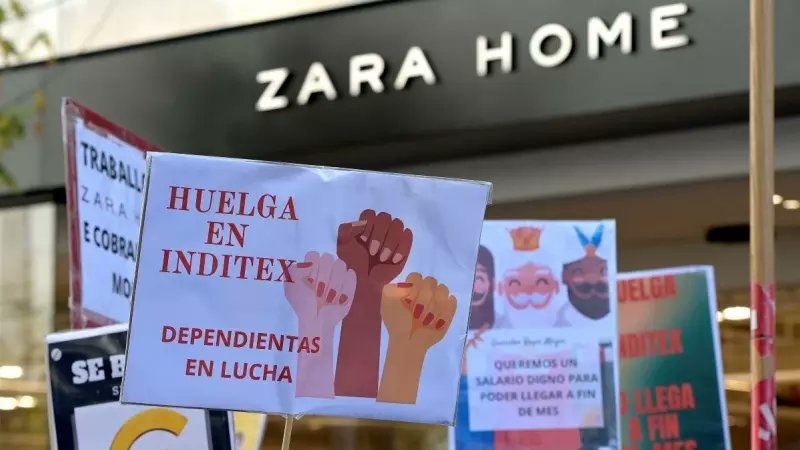
Inflation and the increase in prices of basic products, food and rents have been driving strikes and fights for wage increases in several European countries. The Spanish State is no exception, and the workers of the Inditex group have just demonstrated this with a great victory after months of struggle that wrested a significant wage increase from the company, among other demands.
This last Thursday the agreement between the unions Comisiones Obreras (CCOO) and the UGT took place with the business conglomerate Inditex, which brings together renowned brands such as Zara, Pull&Bear, Massimo Dutti, Bershka, Stradivarius, Oysho and Zara Home.
The agreement included a significant wage increase for the 38,000 store workers. The fine print of the agreement still remains to be elucidated, but according to what has been signed, they will have a base salary that will start at 18,000 euros per year, which implies an increase of between 15 and 25 percent depending on the territory, as well as an equalization of social aid of the template set.
The fight works! Congratulations to the brave women of Inditex and @cgtzaraylefties who have twisted the arm of Amancio Ortega and the CCOO and UGT union bureaucracies who wanted to negotiate for crumbs, with the workers on the warpath since the strike and the streets! pic.twitter.com/M0nR0rOFtC
— Lucia Nistal (@Lucia_Nistal) February 11, 2023
This agreement occurs within the framework of the growing mobilizations and strikes that Inditex workers have been carrying out, organized by the CGT, ELA (from the Basque Country) and CIG (from Galicia) unions in different parts of the State such as Coruña, Gipuzkoa, Araba and Madrid, and especially after the resounding triumph of the shop assistants in Coruña as a result of the mobilizations called by the CIG that achieved an increase of almost 400 euros last December after several days of strikes by the CGT, together with other organizations of the combative unionism, they had been calling rallies demanding a salary increase comparable to their colleagues in Galicia. Within this framework, a successful day of strike was called on January 7, which in cities like Madrid had an important follow-up.
Faced with this scenario, Inditex decided to lean on the CCOO and UGT management and open a negotiating table – in which the CGT does not participate, despite being the majority in the stores in Madrid and with a presence in cities such as Barcelona, Valencia, Seville, Logroño and Valladolid- with the aim of annulling the unions that were organizing the protests as a valid interlocutor and negotiating a ridiculous salary increase that the workforce refused to accept.

Faced with these maneuvers by the company and the union bureaucracy, the CGT called a new day of strike throughout the State on February 11. As the conveners themselves indicated, everything heralded a day of struggle more intense than that of the 7th and a new blow to the corporate image of billionaire businessman Amancio Ortega.
Fearing that it has caused the mobilization to continue to strengthen and a process of self-organization outside the control of the large unions to develop, the company announced the new agreement less than 48 hours before the strike. With this movement, Inditex was trying to make the strike lose strength and give prestige to its union workers who are the bureaucratic leaderships of the CCOO and UGT.
The agreement reached, which involves increases well above the Consumer Price Index (CPI) in some categories and territories, still waiting to see its effective application, It is undoubtedly a victory for the workers who have been fighting against this giant for months. “What the company has signed at that compensation table has been a historic achievement, but because the compañeras have taken a step forward in the streets”, and therefore, “what happened at INDITEX can be an example for other struggles” , indicated in a press conference this Friday afternoon Soledad Aragunde, Aroa de la Torre and Aníbal Maestro of CGT.

In effect, “25,000 workers will be affected by labor improvements that meet the demands they had raised at the beginning of the struggle and that involve a wage increase of between 20 and 25%. In addition to a package of labor guarantees and social benefits based on particular situations, and the equating of Sundays with holidays, ”says a CGT statement.
This victory could have strong repercussions in the textile sector, which is in the middle of a process of negotiating the agreement in several provinces, and can serve as an example for workers from other companies to come out and demand wage increases similar to those of their companions. It is also part of the fight that there is a general level because there is a rise in wages to appease the rampant inflation that is experienced.
But it is not a victory without contradictions, although it is a good agreement, it does not specify how exactly these measures will be carried out. But, in addition, the Inditex employers have negotiated the agreement with the CCOO and UGT leadership, annulling the CGT, CIG and other combative unions.

With this, the company tries to normalize that negotiations and agreements are managed from above with sold out union leaders, who are normally on union leave and have not worked for years or set foot in a store, who in some cases have not even been directly voted for by the workers and that they have never consulted all the workers and have never been controlled by the assemblies, not even by referendum. From combative unionism, and specifically from organizations that have been leading the protest such as the CGT, ELA or the CIG, it is necessary to openly denounce this undemocratic union regime of the Negotiation Tables, in which the templates have no control over the addresses. A system that allows these leaderships not only to easily disorganize the fight in the future, but also to tear down conquests that have been won.
As Soledad Aragunde, president of the Madrid Zara Lefties committee, expressed at a press conference, the success is explained by the CGT’s struggle in the workplace: “It was very hard from the beginning. People have joined CGT because they saw that we were fighting. It has been a battle between the company and the CGT because what the CCOO and UGT were asking for at the negotiating table was outrageous”.

For this reason it is essential to carry out a strong campaign so that those who were really the architects of this victory are known, fighting the strong media campaign that tries to sell this as a success of the negotiations of the big bureaucratized unions. This is a fight no less important than the one developed in these months in the streets, since the bosses and the union bureaucracy have showered money on their related media to steal victory from the militant workers of Inditex.
The struggle of the Inditex workers shows how the big bosses can bend the arm and win important victories. The workers have to rely on this example to do in our companies the same as in Inditex.
The CGT and the rest of the unions that have been at the forefront of the fight have a great opportunity to transform this victory into a great campaign of struggle and organization throughout the state. To organize the workers to follow the example of Inditex and denounce the role of the union bureaucracy that refuses to go out to fight so that the working class does not pay the increase in the cost of living, while trying to impose a wage ceiling , together with the employers and the “progressive” government.
Source: www.laizquierdadiario.com

